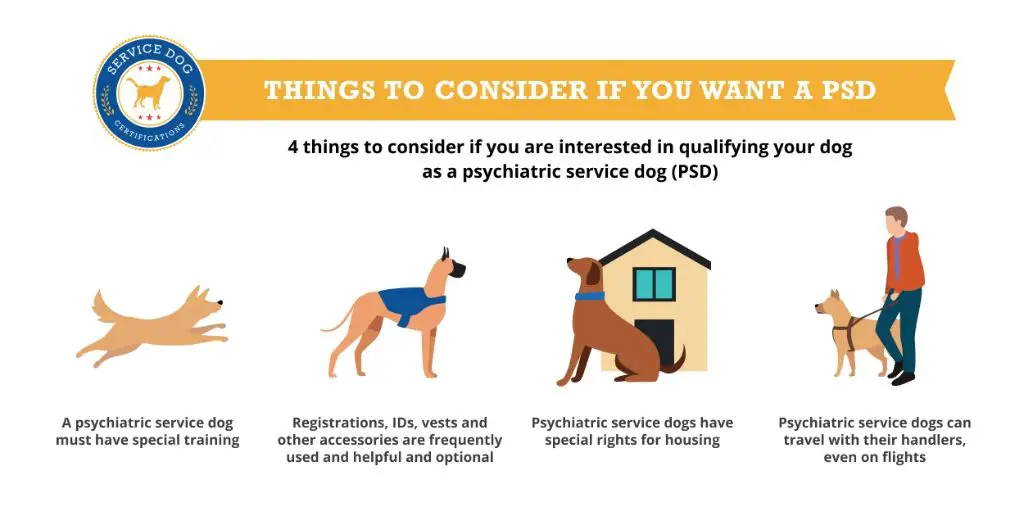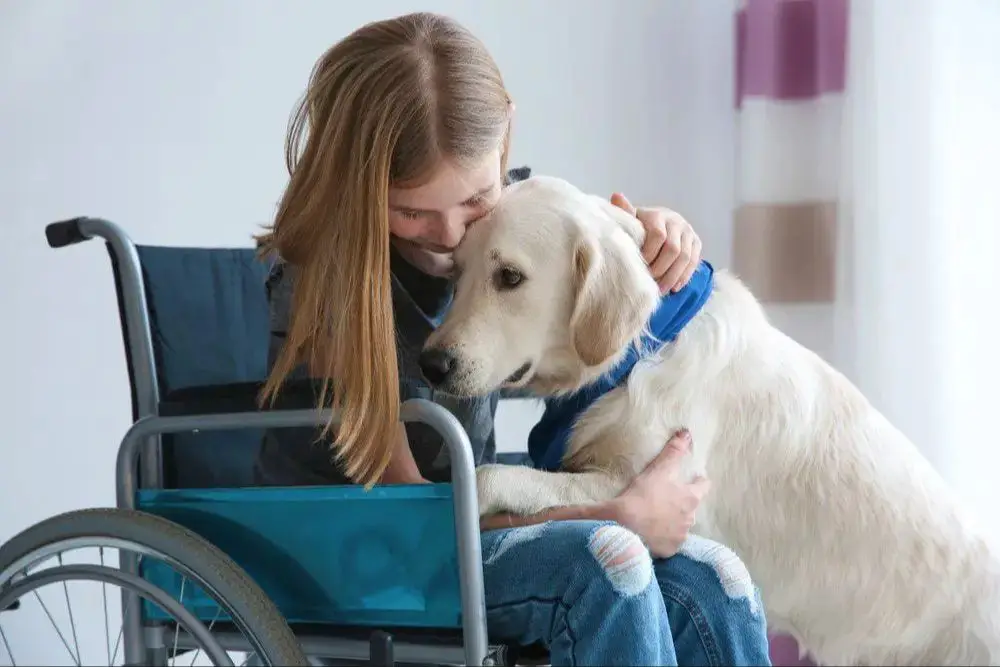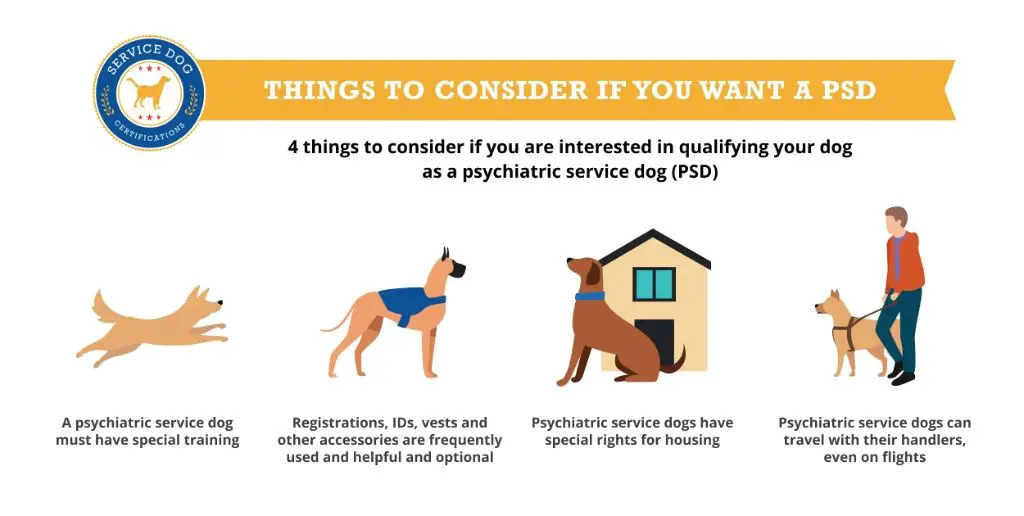Introduction
Service dogs have become an increasingly popular option for people managing mental health conditions like anxiety and depression. The use of specially-trained dogs to provide support for psychiatric disorders has grown as research demonstrates their benefits. Service dogs can assist with anxiety, depression, PTSD, and other conditions by performing tasks to alleviate symptoms and provide comfort (source). Psychiatric service dogs are trained to support emotional regulation, minimize panic attacks, interrupt obsessive behaviors, guide disoriented individuals, and more. When paired with the right person, these service dogs can provide life-changing companionship and stability. This overview explores how service dogs can aid those living with anxiety, depression, and related disorders.
What are Psychiatric Service Dogs
Psychiatric service dogs are a type of assistance dog trained to perform tasks that help people with mental disabilities. They are individually trained to provide specific supports related to a person’s disability like anxiety, depression, bipolar disorder, PTSD, schizophrenia, and others (WebMD).
According to the Americans with Disabilities Act (ADA), a service dog is “individually trained to do work or perform tasks for the benefit of an individual with a disability, including a physical, sensory, psychiatric, intellectual, or other mental disability.” Psychiatric service dogs meet this definition as they are trained to assist people with mental health conditions.
The tasks psychiatric service dogs perform are not limited to fetching items, reminding someone to take medication, providing tactile stimulation to interrupt anxiety or repetitive behaviors, or guiding someone during an anxiety attack or disorientation. Their highly specialized training allows them to directly help mitigate the challenges of many different psychiatric conditions (Certapet).

How Can Service Dogs Help with Anxiety and Depression
Service dogs can help people with anxiety and depression in a variety of ways, including providing comfort and emotional support, reducing anxiety symptoms, encouraging social interaction, and helping with daily tasks.
Some key ways psychiatric service dogs assist their handlers with anxiety and depression include:
- Providing a constant companion to reduce feelings of loneliness and isolation
- Interrupting repetitive or harmful behaviors like skin picking
- Creating a buffer in crowded places that can reduce anxiety
- Waking the handler up during nightmares
- Reminding the handler to take prescribed medication
- Retrieving objects that can calm the handler like a weighted blanket
- Sensing oncoming panic attacks and taking actions to ease anxiety
- Encouraging outdoor activities that can reduce depression
The unconditional love and constant presence of a psychiatric service dog provides significant therapeutic benefits for many people living with anxiety, depression, and other mental health conditions.
Temperament Considerations
When selecting a service dog for mental health conditions like anxiety and depression, temperament is crucial. The dog’s personality traits and character are just as important, if not more so, than their size, coat, or appearance.

Some of the most important temperament traits to look for in a psychiatric service dog include:
- Calm – The dog should have a naturally calm, relaxed demeanor to provide a soothing presence during anxiety episodes or depressive periods.
- Attentive – The dog needs to be highly attentive to cues and body language to anticipate and respond to panic attacks or depressive episodes before they escalate.
- Confident – A stable, confident temperament allows the dog to remain focused amid stressful situations that can trigger anxiety or depression symptoms.
- Intelligent – They must be bright and trainable in order to learn specialized tasks to assist and respond to a variety of mental health needs.
- Friendly – A friendly, social personality enables the dog to provide comfort through physical touch and companionship.
- Eager to Please – Dogs that aim to please their owners are more motivated to perform learned tasks and follow commands.
Breeds like Labrador Retrievers, Golden Retrievers, Poodles, and Cavalier King Charles Spaniels often exhibit these ideal temperaments for psychiatric service work. Their innate characteristics make them well-suited for the highly specialized training required of a mental health service dog.
While some breeds may be predisposed to certain traits, each individual dog has its own unique personality. It’s essential to observe and interact with the dog to ensure they display the proper temperament before committing to training them as a service animal.
Intelligence and Trainability
When selecting a service dog breed for anxiety and depression, intelligence and trainability are two of the most important factors to consider. Service dogs must be able to learn a wide variety of commands and skills to assist their handler. According to the AKC, the most intelligent and trainable dog breeds include Border Collies, Poodles, German Shepherds, Golden Retrievers, and Labrador Retrievers.
Intelligence refers to a dog’s ability to understand new commands, follow directions, solve problems independently, and adapt their behavior based on the situation. Highly intelligent dogs are better able to handle the advanced training required for service work. Trainability is a dog’s willingness and desire to work with humans, follow commands, and perform tasks. Trainable dogs are focused, engaged, and aim to please their handlers.
According to Newsweek, the top service dog breeds like Retrievers and Shepherds tend to be focused workers that form strong bonds with their owner. Their high intelligence allows them to interpret subtle social cues and body language, while their trainability makes them obedient and responsive to commands. These traits enable them to provide critical emotional support and perform helpful tasks for anxiety and depression.
Finding a dog breed that balances intelligence and trainability is key for a successful service dog that can adeptly aid with psychiatric conditions like anxiety and depression. Their advanced cognitive abilities paired with an eagerness to work and please their handler allows service dogs to take on the rigorous training required for their role.
Top Dog Breeds and Reasons
When it comes to the best dog breeds for anxiety and depression, certain breeds stand out for their temperament, trainability, and ability to provide support. Here are the top 5 most recommended breeds and why they make great psychiatric service dogs:

1. Labrador Retriever – Labradors have a friendly, gentle, and eager to please temperament that makes them ideal service dogs. They are intelligent and highly trainable. Their affectionate nature can provide calming support during anxiety episodes. Labs are also energetic enough to get people active, which helps with depression symptoms. [1]
2. Poodle – Poodles are smart, energetic, and adaptable dogs. They form strong bonds with their owners and can sense distress. Their intelligence makes them easy to train to support a variety of psychiatric needs. Miniature and toy poodles can be especially suitable companions for anxiety and depression. [2]
3. Cavalier King Charles Spaniel – This breed is known for its calm, comforting temperament. Cavaliers are affectionate, intuitive, and sensitive to their owner’s needs, making them attuned to providing psychiatric assistance. Their manageable size also suits them for anxiety support. [1]
4. Golden Retriever – Goldens have a sweet, obedient disposition. They bond strongly with their owners and aim to please. Their friendly and sociable nature can motivate people struggling with depression and anxiety to get out into the world. Goldens are highly trainable service dogs. [2]
5. German Shepherd – Known for their intelligence and trainability, German Shepherds work well as psychiatric service dogs. They are loyal and protective of their owners, providing a sense of safety during anxiety episodes. Their confidence and watchful nature can help bring emotional stability. [1]
Acquiring a Psychiatric Service Dog
There are a few different options for obtaining a psychiatric service dog. The first is to get one through a program that specifically trains service dogs. According to the MHA, there are over 20 accredited service dog organizations in the U.S. that provide trained dogs for psychiatric disabilities (Source). The cost can range from $0 for dogs from certain nonprofit organizations to $25,000 or more from some private trainers.
The extensive training and cost make getting a service dog from an accredited organization ideal, but waiting lists can be long. The other option is owner-training, where you get a dog (often a puppy or young untrained dog) and handle the training yourself or with a professional trainer. This costs less upfront, but requires a significant time commitment to properly train the dog over 1-2 years. Either way, having a trained psychiatric service dog can provide invaluable help for conditions like anxiety, depression, PTSD, and more.
Owner Training a Service Dog
Many people choose to owner-train their own psychiatric service dogs to help mitigate anxiety and depression. Owner-training allows you to carefully select the right temperament and breed for your needs. It also helps build an exceptionally strong bond through the training process. However, owner-training requires an extensive time commitment and diligence.

Here are some tips for owner-training a psychiatric service dog:
- Start training early, ideally between 8-16 weeks old.
- Work on basic obedience like sit, stay, come, heel. Use positive reinforcement methods.
- Gradually expose your dog to different environments and people to socialize them.
- Teach them specific tasks to assist with anxiety episodes like nudging, pawing, retrieving medication.
- Focus on public access training in various settings like restaurants, stores, crowds.
- Consider hiring a professional service dog trainer for guidance.
- Plan to train your dog for 1-2 years before having them certified.
- Prepare for the ongoing cost and time commitment of training.
- Make sure your dog has the proper temperament and behavior before bringing them in public.
Owner-training requires extensive patience, consistency and time but can be very rewarding. Make sure to do your research beforehand on training methodology and techniques.
Psychiatric Service Dog Laws
Psychiatric service dogs have legal protections under federal law that allow them access rights. The Americans with Disabilities Act (ADA) protects the rights of people with disabilities to be accompanied by their service animals in public places. According to the ADA, psychiatric service dogs are considered service animals if they are individually trained to perform tasks that mitigate their handler’s disability [1].
Under the ADA, staff may only ask two questions if it is not obvious that the dog is a service animal – 1) is the dog a service animal required because of a disability? and 2) what work or task has the dog been trained to perform? Staff cannot ask about the handler’s disability, require medical documentation, require a special identification card for the dog, or ask that the dog demonstrate its ability to perform the work or task [1].
Additional laws may provide protections for psychiatric service dogs at the state level. For example, in Florida, laws prohibit discrimination against service animal users in housing, employment, and public accommodations [2].
Conclusion
In summary, psychiatric service dogs can provide immense benefits for people living with anxiety, depression, PTSD, and other mental health conditions. By being specifically trained in tasks like creating space in public, waking someone from a nightmare, and interrupting harmful behaviors, these dogs can help mitigate symptoms and improve their handler’s independence and quality of life.
The ideal service dog has a calm, focused temperament coupled with high intelligence and trainability. While many breeds can succeed as psychiatric service dogs, some top choices include Labrador Retrievers, Golden Retrievers, Poodles, and Cavalier King Charles Spaniels due to their combination of traits. Proper training and clear communication of the dog’s access rights under the ADA are paramount for public access.
With their capacity for emotional support, motivation, sensory grounding, and faithful companionship, psychiatric service dogs offer a unique form of treatment that can make daily life more manageable for those with mental illnesses. For the right individual willing to commit to the responsibility of training and caring for a service dog, they can provide life-changing support.